Ammi, Bishop’s Weed, Ajowan
Ameos, Ethiopian Cumin, Alexandrian Cumin, Cuminum RegiumNankhuah, Ajwain (Unani)
Aatrilal (Ammi majus, Unani)
Ajowan, Ajwain, Yavani (Ayurveda)
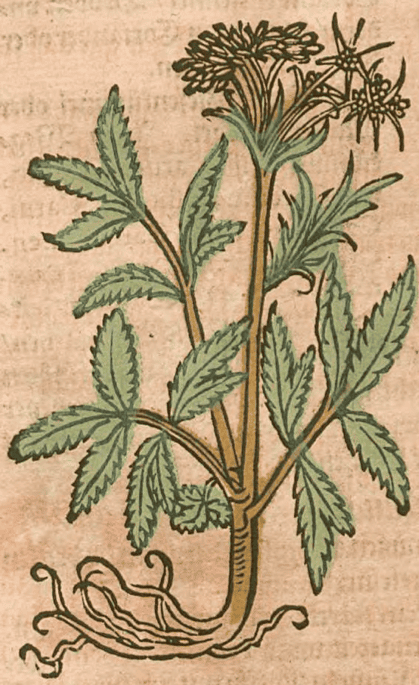 Krauterbuch, Lonitzer, 1578
Krauterbuch, Lonitzer, 1578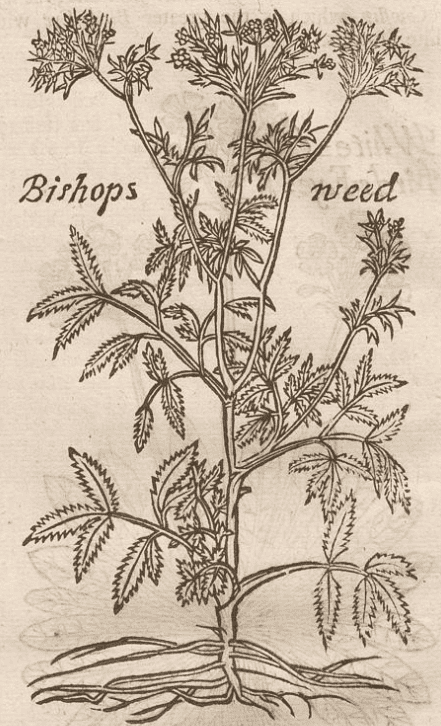 Salmon, Botanologia, 1710
Salmon, Botanologia, 1710
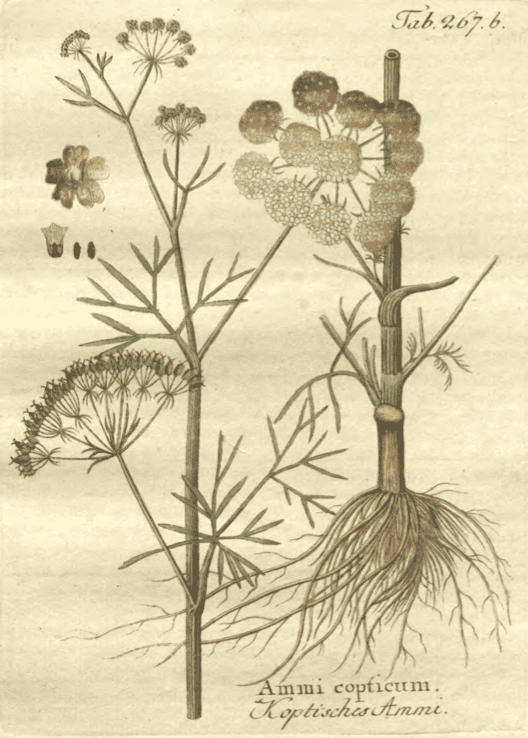
|
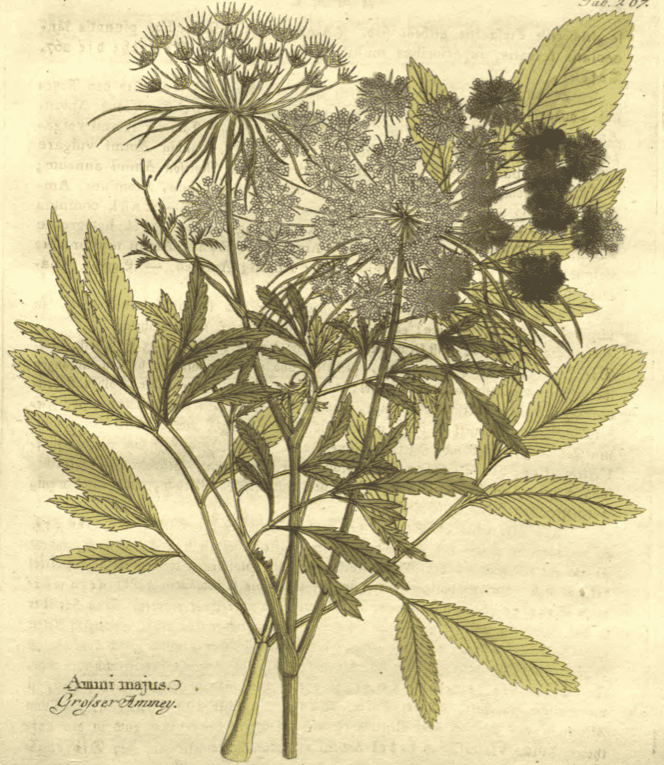
|
Icones Plantarum Medcio-oeconomico, Vietz, 1806
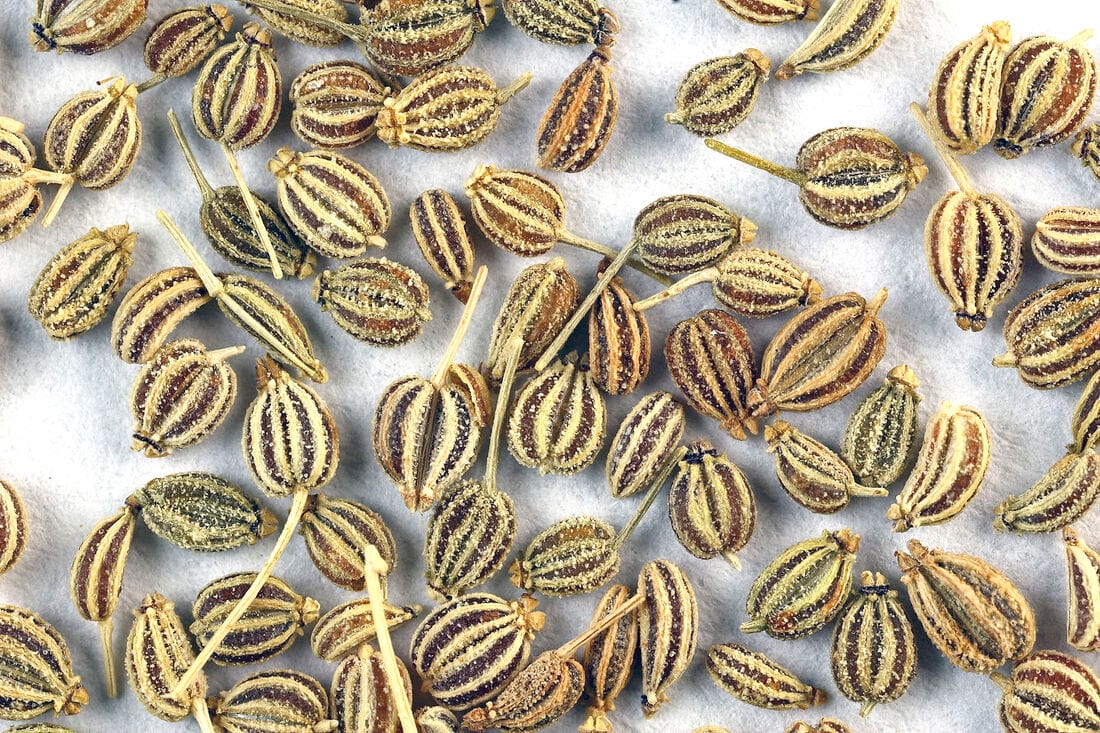 Trachyspermum ammi
Trachyspermum ammi(Photo by Sanjay ach) (Wikimedia)
Botanical name:
Several plants supply Ammi:
- Trachyspermum ammi (syn. T. copticum, Ammi copticum, Carum ajowan, Carum copticum)
- T. roxburghianum
- Ammi majus (syn. Apium ammi, Cuminum aethiopicum, Selinum ammoides; Sison pumilum; Visnaga vulgaris)
- Ammi visnaga
Parts used:
Seed
Temperature & Taste:
Warm, dry. Pungent
attenuating, cutting, aperitive, hysteric, carminative, cephalic, alexipharmic
Classifications:
2K. RESOLVENT
3C. ALEXIPHARMIC 3Q. ANTHELMINTIC
Uses:
1. Warms the Stomach, Clears Wind and Damp:
-Flatulence, tympanites, hiccup
-indigestion, colic, atonic dyspepsia (distilled water or juice can also be used for this function)
-diarrhea, cholera
2. Clears Wind-Cold, Stops Cough:
-Cold, Flu, Fever, acute Sore Throat
-profuse expectoration in Cough, Bronchitis, Asthma
3. Resists Poison:
-Snake bite, Rabid Dog bit and bites of other venomous creatures
-added to various classical Antidotes
4. Clears Damp, Warms and Strengthens the Kidneys:
-Edema, Fluid retention
-Gravel, Stones (seed in powder taken with wine)
-‘mightily provokes Lust’ (Salmon); increases Sperm
-strengthens reproductive organs of both sexes; used for Infertility
-fixed salt was commended for Gout [Arthritis].
5. Moves the Blood, Promotes Menstruation:
-Uterine pain and cramping from Cold and Wind
-Amenorrhea, Dysmenorrhea
-Hysteria
6. Moves the Blood, Settles Internal Wind, Stops Spasms:
-Hypertension, Epilepsy, Hysteria
-Cardialgia, Palpitation (tincture of the seed in 1–2 dram doses taken in wine, Salmon)
7. Kills Worms
-adjunct
8. Externally:
-arthritic and Rheumatic complaints
-fresh herb beaten as a Cataplasm with honey for contusions, bruises
-Vitiligo
Dose:
Powder: 1–3 grams (half–1 dram)
Decoction in Water or Wine: 3–6 grams (1–2 drams)
Juice: 3–6 spoonfuls in wine
Fixed Salt of the Whole Plant: 15–30 grains
Note:
1. The Seed is one of the 4 Lesser Hot seeds; It is used similarly to other seeds of the Apiaceae such as Fennel and Cumin.
2. Salmon said the two ‘Ammi’, native and foreign were equal in strength and properties.
Substitute:
1. Caraway (Waring)
2. Thyme and / or Oregano can replace in some instances
Main Combinations:
1. Cough and Breathlessness:
i. decoct Ammi, add Honey and take with Orris powder (Arnold de Villa Nova)
ii. Ammi with Long Pepper, Belleric Myrobalan, Adhatoda vasica (Ayurveda)
2. Nausea and Stomach weakness, decoct Ammi with Mint and Galangal (Arnold de Villa Nova)
3. Loss of Appetite, Ammi with Cumin, Cardamon, Mastic (as in Powder for Loss of Appetite of Nicholas)
4. Colic, Griping, Abdominal Spasms:
i, Ammi with Fennel seed, Rock Salt and Chebulic Myrobalan (Ayurveda)
ii. Ammi with Chebula, Fennel, Cumin (Ayurveda)
iii. Ammi with Cumin, Clove, Galangal, Calamint, Ginger, Black Pepper, Spikenard (as in Powder of Cumin Greater)
5. Dysentery, Diarrhea with 5 Myrobalans, Cumin, Aniseed, Caraway (as in Powder for Dysentery of Nicholas)
6. Pain of the Liver, Uterus, Stomach, Ammi with Rhubarb, Calamus, Celery root, Fennel seed (as in Electuary of Rhubarb)
7. Amenorrhea, Dysmenorrhea:
i. Ammi with Saffron, Rose, Myrrh
ii. Ammi with Asparagus racemosus, Ginger, Turmeric, Rose
8. To promote Urine:
i. Ammi with Celery seed, Carrot seed, Parsley seed, Madder, Asarum, Bitter Almond (as in Pills to Promote Urine)
ii. Ammi with Celery seed, Saltpeter, Madder, Juniper berry, Asarum, Indian Spikenard, Melon seed (as in Pills for Retention of Urine)
iii. Ammi with Celery seed, Valerian, Carrot seed, Parsley seed, Savin, Fennel seed, Indian Spikenard (as in Pills of Seeds)
9. Urinary stones:
i. Ammi with Tribulus, Madder, Shilajit (Ayurveda)
10. Infertility:
i. Ammi with Cinnamon, Clove, Saffron, Walnut, Pistachio and Testicles (Ram’s) and Uterue (Rabbit) (as in Decoction for Sterility)
ii. Ammi with Ginger, Cinnamon, Long Pepper, Turnip seed, Indian Spikenard Cardamon, Bay berry, Nutmeg, Marjoram (as in Warming Confection for Infertility)
iii. Ammi with Madder, Mugwort, Wormwood, Fennel root, Marjoram, Clove, Balm, Cyperus root, Cinnamon, Raisin, Mastic, Saffron, Zedoary (as in Electuary to Promote Fertility)
11. Mental tension, Ammi with Centella, Hydrocotyle asiatica, Withania (Ayurveda)
Major Formulas:
Decoction for Sterility (Quercetan)
Electuary of Rhubarb (Unani)
Expert Electuary of Catilinae
Electuary of Bayberries (Electuarium de Baccis Lauri)
Warming Confection for Infertility (Wirtzung)
Electuary Preventing Drunkenness (Unani)
Electuary to Promote Fertility (Wirtzung)
Powder of Cumin Greater (Nicholas)
Powder for Loss of Appetite (Nicholas)
Troches of Saffron (Nicholas)
Pills to Aggregate Greater (Mesue)
Pills to Promote Urine (Unani)
Pills for Retention of Urine (Wirtzung)
Eight-Limbed Electuary (Ayurveda)
Cautions:
1. Phototoxic
Main Preparations used:
-
Extra Info
- History
|
‘Bishop’s weed has been in use in India as a condiment and medicine from a very remote period; we find it mentioned by the early Sanskrit writers under the name of Yamani. It is the Nankhwah of Ibn Sina. The Persians call it Zinian and Nankhwah, a name derived from Nan, bread, and Khwah, desire, and given to it on account of its stimulating effect on the appetite. The author of the Persian Dictionary, Burhan-i-katia, gives Talib-el-khubz as the Arabic name, which is equivalent to the Persian Nankhwah. In the Makhzan-el-Adwiya, Kamun-el-muliki is given as the Arabic, and other writers again give different synonyms, so that there is a difficulty in deciding which of the notices in Arabic works have reference to this drug. As pointed out by Fliickiger and Hanbury, |
the fruits of Ammi majus, L., and Sison amomum, L., have often been confounded with it. The Tuhfat-el-muminin gives Ammi as the Greek name of Ajwan. In native practice, Ajowan is much used as a carminative, either alone or in combination with rock salt, asafoetida, myrobalans, &c. It is also thought to check discharges of a chronic kind, and is therefore used in making lotions, collyria, &c.; upon the same principle it is prescribed in bronchitis with copious expectoration. A plaster or poultice of the crushed fruit is said to relieve pain. The Ark or distilled water of Ajowan is prepared and sold in the bazars.’ (Vegetable Materia Medica of Western India, Dymock, 1885) |
